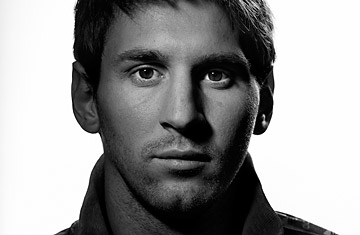
Lionel Messi of FC Barcelona, photographed Jan. 11, 2012
One of the benefits of being utterly uninterested in sports is that you don't get nervous when you interview one of its biggest stars. At different points before our interview, each of my soccer-obsessed colleagues — writer Bobby Ghosh; photographer Joachim Ladefoged; and Rasmus Ranum, his assistant — confessed to feeling slight anxiety as he prepared to meet Lionel Messi. But I — who, after all, was only translating the interview — was the calmest person in the room. Or at least I was until Ghosh reminded me how difficult an interview with the famously reticent Messi is. "We're about to talk to possibly the greatest player in the history of the sport, and it's up to you to make him comfortable," he said. "But no pressure."
To all of our relief, the interview went better than expected, though there was a telling moment during the photo shoot when Ghosh asked Messi which he disliked more, giving interviews or being photographed. "Both," he replied, shoving his hands deep into his pockets. That lack of elaboration or explanation, we had already learned, was typical: Messi had resisted all our efforts to pry a story or anecdote out of him. In one desperate bid for a bit of color about his time in Barça's famous training academy La Masía, I asked him how the meals were, hoping for a memory of a favorite or reviled dish. His answer: "They were fine."
What was more interesting was how no one else we spoke to, even people within Barça who had watched him grow up, seemed to have any personal anecdotes about him either. We kept trying to get at the person off the pitch, only to find that there really wasn't one. So dominant was Messi's single-minded dedication to his sport that it was, quite literally, all anyone could talk about.
Upon hearing of the interview, our friends, acquaintances, and colleagues in Barcelona inquired about it with more than passing curiosity. Cab drivers, fellow journalists, the acclaimed chef Albert Adrià, even the two local fans Ghosh met at a bar while watching a match — all asked how it went in a tone both knowing and rueful. Knowing, because they knew what Messi was like with the press. And rueful because, for all their pride and joy at having him play for Barça, I think it pains them that they don't know him better.
That Messi has chosen to maintain his Argentine identity is something that Barcelonans can understand. After all, they embrace with fierce pride their own Catalan identity — and see the Barça team as a major expression of it. But that doesn't mean they're not a bit disappointed by his choice. After all, Catalans are famously open; all it really takes to become one of them is to learn to speak Catalan. That Messi doesn't want to (those who know him say he understands the language), even after 12 years of living among them, is a little hard for them to process. As is the fact, repeated by many of our sources, that he doesn't go out much in Barcelona; that in their loveliest of cities, they never see him at movies or restaurants like they do his teammates.
El País sportswriter Ramón Besa told us that he thought Messi needed an interpreter — someone who, like the girl who sat next to him in school and answered the teacher's questions on his behalf, could act as an intermediary with the world. With Barça, he has found that interpreter in coach Pep Guardiola. But you can't help feeling that Barcelonans, who are so thrilled to have him playing for their team and so ready to embrace him, wish Messi would just let them in.
